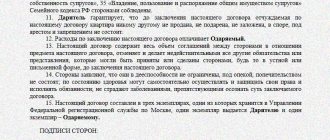But, despite such a difference in the subjects of the transaction, it is carried out according to the general rules established by law, sometimes with the slightest amendments. Property, once in the ownership of a new citizen, acquires a new status .
But sometimes a completely logical question arises - is it possible to transfer an apartment received by gift? Is such an action possible? Are there any restrictions on this fact or are they not significant?
Such cases arise and arise frequently, and often new transactions are not carried out or are carried out with errors only because citizens have no idea what they can count on and what they cannot. Therefore, let's talk about whether such a procedure can be carried out or not.
You can find out whether a donated apartment can be sold in our article.
Is it possible to transfer an apartment received by gift?
Art. 572 of the Civil Code determines the possibility of transferring property between two parties free of charge.
One of the ways to alienate real estate is through donation. If all papers are completed correctly, the donor loses ownership of the object. Authority for the apartment is transferred to the recipient, who must register it with Rosreestr. After which he becomes the full owner, receives the right of ownership and disposal.
Is it possible to re-donate such an apartment? Definitely, this can be done. But here it is important to draw up the deed of gift correctly again. After it comes into force, the new applicant will become the owner of the property. In turn, he will be able to alienate the object.
An applicant who received an apartment as a gift is interested in whether it can be donated. In fact, the law does not limit the number of acts of donation. Both selling and donating an apartment can be done countless times. Only in each new case a new deed of gift is required.
Submission of documents
What documents are required? In order for the transaction to be properly registered, you need to prepare the correct package of documents . It should include the following documents:
- passport;
- gift agreement;
- real estate ownership documents;
- technical documentation;
- certificate of payment of the duty;
- tax payment certificate;
- a previously drawn up deed of gift.
You can find out whether you need to obtain the consent of the second spouse to transfer an apartment as a gift, as well as whether you can donate living space by power of attorney on our website.
All these documents must have their own copies .
You may also be required to provide a certificate confirming the absence of debts for utility services, as well as a certificate from the BTI on the composition of those registered.
Documents are submitted to Rosreestr or a multifunctional center.
There, at the initial stage, they get acquainted with the contents of the papers, and only then they can transfer them to the next employee to formalize the transaction.
Legal opportunity
Is it possible to donate donated living space if the donor is alive?
Since we have seriously taken up the discussion of such a complex concept as donation and possible transfer, we need to first turn to the conceptual apparatus in order to be sure to know all the information about the procedure under discussion.
Donation is a transaction that is regulated by civil law, or rather, by the civil code itself. This procedure has many characteristics. Let's start with the basics.
So, donation is a two-way transaction. Why? First of all, because two parties take part in it. One of them is called the donor. The donor has the right to alienate real estate from his property in order to transfer it to a second party.
The second party is called the donee. This subject of the transaction accepts real estate from the donor, and then it becomes his full property. However, sometimes the donee may refuse the gift and then the transaction is terminated.
The next characteristic of donation is gratuitousness . And indeed, the entire procedure is carried out free of charge, that is, for the fact that the donor donated property to the recipient, he receives nothing.
Now we know what the transfer of housing as a gift is. And what then, according to all the rules, is re-gifting ? In fact, this is exactly the same procedure that is carried out immediately after the donee has become the direct owner.
There is no such thing as a transfer in legislation, so the name of the transaction is used as a donation. It is carried out according to the same criteria as a regular donation, based on Chapter 32 of the Civil Code.
An important nuance is that the original donor must be informed and aware of the state of his property and subsequent transactions with it, because he still retains the right to cancel the donation in special situations.
Acceptable deadlines
After what time can the donated housing be donated?
You can donate living space that has already been involved in the donation procedure once, as soon as all the documents proving the rights of the new owner to the housing have been completed. Roughly speaking, as soon as the deal is formalized.
However, there are a number of nuances, one of which concerns the conditions specified in the contract . So, for example, if the deed of gift states that the donee can take ownership only upon the achievement of certain conditions, he cannot transfer the housing as a gift until these conditions have been met.
For example, the most common case is the entry into ownership rights only upon marriage or graduation from a higher educational institution.
Read our article about the time frame within which a donor can revoke a deed of gift for an apartment.
Is it possible to give the apartment back to the donor?
Features of a gift as a type of civil transaction
When concluding a gift transaction, the donor must take into account the peculiarities of such a civil legal relationship.
The main features of the deed of gift under which housing is donated are as follows:
- The law limits the period after which the agreement can be canceled. As a general rule, a deed of gift can be contested within three years from the date of preparation. In this case, the contesting parties must present evidence that confirms the illegitimacy of the transaction.
- If the power of attorney is drawn up by a representative of the home owner, then his powers must be certified by any notary in the manner prescribed by law. Otherwise, the transaction is considered illegal.
- The deed of gift is always drawn up in writing in two copies, each of which must be signed by the donor. One of them is transferred to the donee, and the other remains with the donor. When they are received, both parties will be able to certify the fact of the donation in the event of disputes.
- In cases where the donor or recipient is a child under 18 years of age or a person who does not have legal capacity, then the consent of the guardianship authority, as well as the appointed guardian, is required to make the gift.
- In cases where the object of the donation is housing, which, in addition to the donor, also belongs to other persons, the consent of these persons is required. If the donor is an individual owner, then the consent of third parties is not required to transfer.
Thus, the validity of a repeated donation of housing depends not only on the legitimacy of the rights of the donor, but also on the existence of the rights of other persons, the status of the parties to the transaction, and so on. Failure to comply with one of these conditions entails the invalidity of the transaction. In addition, it is necessary to take into account the possibility of the previous owner returning the property when it cannot be transferred.
When a donation is made, there are always interested parties who are ready to challenge such a transaction and return the donated apartment.
For this reason, it is better to entrust the drafting of a transaction to professionals who are well versed in the nuances of the transaction and legal norms. Security of the transaction is the main condition for any party in civil legal relations.
Who can be a donor?
A gift worth less than 3 thousand rubles can be given by anyone to anyone. For more expensive gifts, there are restrictions in the Civil Code.
The donor cannot be:
- a minor citizen, that is, a child under 14 years of age, either personally or through a legal representative. From the age of 14, expensive gifts can be given with the written consent of parents (adoptive parents, trustees); if we are talking about real estate, you will also need to obtain permission from the guardianship and trusteeship authorities. The exception is the complete emancipation of a child at 16 years of age;
- a citizen declared incompetent, either personally or through a legal representative.
Who should you not give gifts to?
According to the Civil Code, it is prohibited to give expensive gifts (more than 3 thousand rubles):
- employees of educational, medical, social and similar organizations, including employees of organizations for orphans and children without parental care, on behalf of those who are treated, studied or kept in these organizations, and their relatives;
- persons holding state and municipal positions, state and municipal employees, employees of the Bank of Russia in connection with their official position or in connection with the performance of their official duties (with the exception of gifts in connection with official events, but even in this case, gifts are more than 3 thousand rubles are recognized as state property);
- commercial organizations, if the recipient under the gift agreement is also a commercial organization.
Some nuances
When thinking about making a transfer, it is necessary to take into account certain obstacles that may accompany the transaction. So, property cannot be donated to everyone. There is a circle of subjects who cannot accept a gift due to their legal status.
And even signing an agreement does not eliminate the risk that it will not be subsequently challenged. Therefore, before the final version of the agreement is sealed with signatures, you should know such points.
Categories of persons who cannot be gifted
It is not permitted for an incapacitated citizen to receive a gift. Otherwise, the transaction will be contested. If the owner of the apartment is a company, it does not have the right to transfer it to another company.
When a person is registered or maintained in a medical, educational, or social institution, he cannot donate an apartment to an employee of such an organization.
Finally, it is prohibited to make gifts to officials (in an amount exceeding 3 thousand rubles) as gratitude for services rendered. Such a restriction is directly present in Article 575 of the Civil Code of the Russian Federation.
And also, you cannot donate an apartment (part of it) that is owned by a child under 14 years of age. The legislation also does not provide for such actions (clause 1 of Article 575 of the Civil Code of the Russian Federation).
Grounds for returning the apartment to the original owner
There are several grounds on which an apartment can be legally returned to its original owner. The first of them is that the gift agreement is invalidated. There may be several reasons for this.
For example, in court it will be officially proven that at the time of signing the deed of gift, the donor could not realize the significance of his own actions or was under pressure or threats. In addition, the donation is contested if the common family property has been alienated without the approval of the second spouse.
The first owner of the apartment can cancel the donation if the owner of the gift treats it extremely carelessly and worsens its condition. However, all facts must be proven in court.
Finally, the first donation can be canceled if the donee commits illegal actions against the owner. This will require an appropriate court verdict.
A few words about taxes
If a person receives real estate under the terms of transfer, then he will have income and, therefore, will have to pay a tax at a rate of 13% of the cadastral value of housing (non-residents pay 30%). There will be no personal income tax in the case when the apartment is transferred to close relatives.
These include:
- husband wife);
- mother or father;
- children;
- grandparents.
There is no income tax when an apartment is transferred between siblings or half-brothers (sisters).
At the same time, regardless of the degree of relationship between the participants in the deed of gift, the recipient of the housing becomes the payer of the annual real estate tax.
If a person received an apartment as a gift, he must notify the tax office about this in writing. This must be done after December 31 of the following year.
Certain details of property taxation may be established by the legislation of the capital, St. Petersburg, and Sevastopol. Such local regulations may be adjusted annually.
The payment amount directly depends on the area of the premises. There is also a tax deduction, which in relation to an apartment amounts to the cost of 20 square meters of total area (clause 3 of Article 403 of the Tax Code of the Russian Federation).
There is no need to submit any apartment tax declarations to the Federal Tax Service. The tax office itself will notify the homeowner in writing about the need to make a payment, its amount and details. However, the absence of such a notice does not relieve one from liability to the budget.
Pros and cons of giving
The advantages of the deal are as follows.
- The procedure for registering a deed of gift for an apartment is simple - just draw up a contract correctly and collect the necessary package of documents for submission to Rosreestr.
- Does not require notarization. An exception is situations when it is necessary to formalize the donation of a share of an apartment or real estate that belongs to an incapacitated person or a citizen with limited legal capacity (in accordance with the requirements of Law No. 218-FZ). At the same time, the notary fee for donating housing to a close relative has been reduced (Article 22.1 of the Fundamentals of Legislation on Notaries).
- Optimal conditions for registration. If the parties to the transaction are far from the management of Rosreestr, the apartment donation agreement is transferred there through the MFC, located in almost every locality.
- Registration of the transfer of ownership is carried out quickly - up to 9 working days.
- Personal income tax is not paid.
- A gift does not become the common property of the spouses, unlike a purchase and sale transaction. This point is especially important for the parents of the donee, since no one wants to share their property with their son-in-law or daughter-in-law.
There are also downsides to the deal.
- The donee does not have the right to dictate the terms of the contract, since the re-registration of the apartment to a relative is carried out solely by the good will of the owner of the property.
- Absence of corresponding obligations on the part of the donee.
- Possibility of challenging the agreement by third parties.
Thus, registering a gift of real estate to a relative is beneficial, but, as with any other transaction, there are also disadvantages of the procedure.
Summary
Is it possible to transfer a deed of gift for real estate (apartment)? Is it also possible to transfer a deed of gift? Lawyers sometimes hear these questions. To transfer real estate received as a gift, a citizen can begin the process after he officially registers the property in his name and becomes the full owner.
To avoid refusal to formalize the transfer of rights, you should seek the help of a lawyer. A professional will be able to correctly draw up any type of document, including a gift agreement. He will correctly prepare the required package of papers and will also provide for all the nuances that often arise when resolving such cases. There is an important addition - during the transfer of real estate, the first copyright holder can challenge the transaction in court if he considers the actions illegal.
Transfer of deed of gift
Is it possible to transfer a deed of gift for an apartment? Or donate the house received by deed of gift? The law does not prohibit the implementation of these expressions of will, including the return of a gift back to its donor. A citizen, becoming an owner, is endowed with all rights and can independently dispose of a gift received from someone. Owners can transfer movable and immovable property (including an apartment, a house) to whomever they want.
But the legislation provides for a list of persons who are not allowed to perform these actions (donations) from clients and people related to them.
This list includes:
- civil servants;
- municipal employees;
- medical workers, and teaching staff (schools and other children's institutions).
Despite the prohibition in the law, in reality, employees of multifunctional centers and Rosreestr do not check the status of the person receiving the donation.
But you can transfer donated property - an apartment or a house - back in accordance with Article 578 of the Civil Code of the Russian Federation, which describes the case when a donation is returned to the donor:
- with the personal voluntary expression of the will of the recipient;
- or the donor demands that the donated property be returned (such actions are resolved in court);
- if the court recognizes the invalidity of the deed of gift.
In order to return the donated property at the will of the real owner, you must go through the usual legal procedures implied when registering a gift.
Category of persons who cannot be gifted
The legislation provides for categories of persons who are prohibited from donating real estate from their clients and relatives. These categories include:
- civil servants;
- municipal government employees;
- incapacitated and minor persons;
- workers of medical and educational institutions.
But although there is a ban on donating real estate to civil servants and municipal employees, no one at the registration authority or MFC checks the status of the donee.
Registration of transfer
The donation procedure has its own characteristics and legal subtleties. Let us consider in detail the process of registering a deed of gift in general terms.
Transfer procedure
The first step will be drawing up a deed of gift. This agreement must indicate the personal data of the parties and a description of the object to be transferred. The deed of gift must be notarized. In addition, for the transaction to be legal, you will need to go through the procedure of state registration of rights.
To do this, you need to contact the territorial department of Rosreestr or the MFC at the location of the object. You can also submit documents by registered mail with notification or via the Internet on the official website of the department or on the State Services portal.
The following documents will be required for registration:
- registration statement from the parties to the transaction;
- general civil passports of the Russian Federation of the parties;
- receipt for payment of state duty in the amount of 2000 rubles;
- documents of title for the subject of donation (deed of gift);
- legal document (extract from the Unified State Register or certificate);
- a certificate of the composition of persons registered in the donated apartment (issued at the housing department, passport office or other authorized institution).
A receipt for payment of the state fee is not required, since the data on receipt of payment falls into the general database. However, to avoid misunderstandings, it is better to save it until the end of the registration procedure.
Legal nuances
As with any transaction, the transfer process has certain features. It is important to consider the following aspects:
- Cancellation of a deed of gift is possible only within three years from the date of its registration. To do this, you will need to prove that the transaction was made under pressure or as a result of fraudulent actions by one of the parties.
- If the donee cannot be personally present at the execution of the contract, a representative can act instead on the basis of a notarized power of attorney.
- After the transaction is concluded, each party retains a written original deed of gift. It is also necessary to prepare a third copy for Rosreestr.
- If the gift is given to a minor or incapacitated person, the guardian or legal representative must consent to the transaction.
If part of a house or apartment that is in shared ownership is transferred, the consent of the co-owners, executed in writing, will be required.
Transaction cost
Despite the fact that you can re-donate property endlessly, it should be borne in mind that this procedure is not entirely free.
Upon registration you will need to pay:
- state fee for registration of property rights (2000 rubles);
- payment for notary services (depending on the value of the property);
- income tax of 13% (not in all cases).
Donations that are not between close relatives and family members will be taxed. The obligation to pay the tax payment arises from the donee. The tax amount is calculated based on the cadastral value of the property and, as a rule, amounts to a very significant amount. To avoid paying taxes, some citizens do not draw up a deed of gift, but a fictitious purchase and sale agreement.
However, this option is not always suitable. For example, a serious advantage of donation is the fact that the donated real estate is not the joint property of the spouses. In the event of a divorce, it will be transferred in full to the spouse to whom it was gifted. All expenses for completing the transaction are borne by the donee, since he is the beneficiary.
Other subtleties
In general, donation is a simple procedure. Difficulties can arise only at the stage of drawing up a new deed of gift. Can Rosreestr or MFC refuse to register a transfer of rights? They can. There may be two reasons: incorrect drafting of the gift agreement or the absence of any documents. To avoid refusal, seek legal advice from a specialist. A professional lawyer will help you draw up a competent gift agreement and help provide for all the nuances of the transaction.
Obstacle to the transaction
The donation procedure is quite simple; the ability to carry it out without the obligatory assistance of a notary makes it possible to save money and resolve the issue yourself. We must not forget that there is always the possibility of an artificial delay in the transaction, or even the impossibility of completing it.
The negative aspects that prevent you from donating an apartment, including the following, include:
- Poorly drawn up gift agreement. The consequence may be a refusal in future registration of property with the need to correct shortcomings.
- The need to pay state fees and expenses when applying to a notary.
- Obligation to pay 13% tax for participants not closely related.
If a beneficiary, even a close relative, decides to sell an apartment owned for less than 3 years, the value of which exceeds 1 million, then he is obligated to pay a tax of 13% on the sale.
Spouse's consent to the transaction
With an initial donation and a repeated donation, different requirements arise regarding the need for the consent of the legal spouses.
When real estate is donated for the first time and is jointly owned by both spouses, a written notarized permission for its subsequent donation is required. In addition to other specific features on the ownership of property by each of the spouses, which may be provided for in a previously drawn up marriage contract.
The fact that one of the parties is married does not in any way affect the re-donation. Even when the new owner was related by marital ties at the time of receipt of the property, if it is intended solely for one person’s possession and use. This feature is useful in that it can protect the owner of the apartment during a divorce (Clause 1 of Article 36 of the RF IC).
Multiple recipients
If the question arises: “Is it possible to issue a deed of gift for two people?” Then the answer will be positive. In addition, the number of recipients may be more. For such cases, there are multilateral agreements under which there are either several donees and more than one donor (Article 420 of the Civil Code of the Russian Federation).
Transaction price
It is possible to carry out transactions of donation of the same property indefinitely, despite this, it should be taken into account that this is a paid procedure. When registering, you will need to pay:
- fee for registration of property rights;
- notary services (the amount depends on the price of the object of donation), if you turn to them for help;
- income tax (13 percent), if ownership of the object is not transferred between close relatives.
Tax payment is obligatory for the recipient citizen. Tax is charged on gifts that do not occur between immediate relatives, but also between family members. The tax amount is calculated based on the cadastral price of the property.
The advantage of a gift is the fact that the donated property is not the joint property of the husband and wife. In the event of a divorce proceeding, the donated property will become the property of the spouse for whom the deed of gift was issued.
Material expenses incurred during the preparation of documents will be borne by the recipient.
Registration in Rosreestr
So, the acquisition of an apartment by the recipient takes place after entering data about him into the Rosreestr. In this case, he acquires the right to dispose of the object, including its donation, inheritance, and sale. A one-year period is allotted for re-registration.
Documents that will be required when applying:
- Statement by the applicant in which he agrees to the transaction.
- A receipt confirming that the state duty has been paid.
- Papers for the apartment:
- cadastral extracts;
- title papers.
- Passports of the parties to the transaction.
- Certificate of family composition.
Authorized bodies are given no more than 10 days to process the application. If all requirements are met, data about the new owner is entered into Rosreestr. If there are not enough documents, the applicant is given time to collect them.
Registration of a new owner requires the participation of all parties to the transaction. If a citizen cannot appear in person, they can act through a proxy. To participate in the process, the representative will need a notarized power of attorney.
If the donor dies before the information about the new owner is entered into the state register, the apartment is inherited on a general basis: by will/by law. Real estate rental and sale is allowed only after registration with Rosreestr.
Getting the result
According to regulatory documents, the total period for the procedure for registering property rights is 10 working days from the date of submission of the package of necessary documents to Rosreestr. When notarizing a deed of gift, the time is reduced to 3 working days.
If you submitted documents through the MFC, the period may be extended by several days, since it takes more time to process the papers in the center itself. And you can receive the finished documents after only 11-13 days.
Notarization
Notarization of the transaction is an optional, but desirable condition. The presence of a specialist during the registration process helps to avoid many problems. The first advantage of such participation is the legal literacy of the document; there will be no difficulties when registering the object.
The second point is confirmation of the legal purity of the transaction. It is difficult to challenge documents certified by a notary, citing the donor’s inadequacy or non-compliance with the rules of donation. For the court and other authorities, it is obvious that the procedure was carried out according to the law, therefore, there are no grounds for recognizing the transaction as invalid.
Transactions between close relatives are not subject to gift tax.
Features of refusing a gift
Both procedures (donation and refusal) must be carried out by legally capable and adult citizens. During notarization, the specialist has the right to request a medical certificate of the donor’s sanity and legal capacity. Since the recipient acts as a donor when returning, all procedural provisions apply to him in the same way. The subtleties of reverse legal actions are most often unknown to citizens, which is why they make mistakes and can significantly harm their interests.
The deed of gift is beneficial for relatives and members of the same family, since it is not necessary to pay 13% of the value of the property. For the rest, you will need to pay income tax; for foreigners, the tax will be 30% of the value of the gift. It is these different costs that sometimes push citizens to falsify and provide false information about the degree of relationship. The tax inspectorate checks submitted reporting documents and identifies unscrupulous taxpayers.
The deed of gift has always been a legal option for resolving family issues of ownership. A gratuitous contract allows you to transfer expensive property to a selected relative during your lifetime. This prevents disputes that often arise in inheritance matters. But sometimes the consequences of this step require a reverse re-registration, sometimes a life situation requires refusal of the gift. If the opposite action occurs by agreement of the parties, then the clause of the agreement includes the terms of payment of expenses and the procedure for the actual transfer of the apartment, the issue of registration of residents.
USEFUL INFORMATION: How to avoid depression after a forced divorce
To the question: is it possible to return a donated apartment back, there is a legislative answer. The recipient has the right to do this without providing compelling reasons. It is advisable to conclude such important agreements with a notary, who can subsequently act as a witness and confirm the adequacy of the donor. Often, after the donation is formalized and registered, third interested parties begin legal proceedings in order to prove the illegitimateness of the agreement.
If the situation has changed dramatically, it is recommended to first find out whether it is possible to return the donated apartment back without trial. If it is possible to reach an agreement, then the problem will be solved peacefully faster and without significant financial costs.
Features of drawing up a contract
If the owner of the property is closely related to the recipient, then the consent of other residents is not required. In some cases, a transaction may arouse suspicion in certain authorities, which is why it is necessary to make the transaction as transparent as possible, because fraudulent actions can lead to undesirable consequences.
Requirements for the contract
The gift agreement must be drawn up in accordance with the generally accepted model. It must also be signed by both parties. In addition, a deed of gift that contains a typo or error will not be accepted for consideration. That is why it is very important to contact a notary before submitting documents to the registration authority.
Receipt times and cost
When contacting Rosreestr, the time frame for receiving documents will be expedited from three to seven days. However, if you contact a multifunctional center, it is quite possible that the deadlines will be slightly different, because this body itself does not register the transaction, but only transfers it to Rosreestr.
The state fee for registration of the donation procedure is three hundred rubles. It must be paid before submitting documents to the registration authority.
If the donor and the donee are not close relatives of each other, then they will also have to pay a tax fee of thirteen percent of the transaction amount.
Tax on transfer of an apartment
When concluding a transaction for donating real estate, a mandatory tax to organize the activities of the public service. Another fee is established in individual cases and depends on the cost of the apartment.
Real estate alienated to close relatives holding Russian citizenship is not subject to property duty.
If the successor does not have blood ties with the actual owner or is distantly related to him, the purchasers of the apartment pay property tax in the amount of 13% of the total cost of housing. If the recipient of the property is a citizen of a foreign state or a person who does not have a certain registration, the tax rate is set at 30% .
Advantages and disadvantages
A gift agreement, like any other agreement, has its disadvantages and advantages. The advantages include:
- there is no need to pay income tax (in case of a gift between immediate relatives);
- in the event of a divorce, the donated housing remains the property of the donee, since according to the law it is practically impossible to divide it.
But if we are talking about executing a transaction with distant relatives or strangers, then it is recommended to draw up a purchase and sale agreement, because in such a situation the transaction is subject to a 13% tax on the value of the property.
Watch an interesting video about how to return a donated apartment:
Subtleties of the process of drawing up a deed of gift and registration of an object
We found out whether it is possible to re-donate a donated apartment. It's definitely possible. Now let's talk about the nuances that may arise in this matter.
So, important subtleties:
- The gratuitous transfer of real estate can be canceled before the expiration of 3 years. The countdown begins from the moment the transaction is concluded. The grounds for cancellation must be compelling - fraud, threat to health and life. They must be confirmed.
- A trustee can represent the interests of each party. This could be a relative, a lawyer or any other person who will have a notarized power of attorney for these operations.
- If the party to the contract is a minor/incapacitated person, then the consent of the parent/guardian is required.
- The transaction should not infringe on the interests of third parties, especially if these are socially vulnerable segments of the population: children, disabled people, elderly citizens.
- When owning an apartment together, the donor will need the consent of the other co-owners to the procedure.
- The agreement is drawn up in 3 copies.
Reverse action
Is it possible to give back a donated apartment? When choosing a candidate for transfer, it may also be the person who originally gave you the property . There is nothing terrible or unnatural in this, and this person may well become the recipient.
However, if you are not close relatives, this fact still does not exempt you from having to pay tax on the transfer of housing as a gift.
Find out on our website whether it is worth accepting an apartment with an encumbrance as a gift, such as a mortgage or the right of lifelong residence of the donor.
Is it possible to challenge a deed of gift and how?
Legal relations can be of two types: void and contested. In the first case, we are talking about drawing up an agreement with gross violations of the law, therefore it is initially invalid. In the second case, the decision on the invalidity of the transaction is made by the court.
You can challenge a deed of gift in court on the following legal grounds:
- the agreement was concluded without the presence of the necessary permission from a government agency (for example, the consent of the guardianship and trusteeship authorities to alienate the share of a minor was not obtained);
- a person was forced to hand over an apartment;
- the donation was made by a citizen who does not have full legal capacity, without the knowledge of the representative;
- the spouse’s consent to the alienation of the premises has not been obtained;
- the donor was not aware of his actions when drawing up the agreement;
- the re-registration of housing was carried out due to a mistake.
A lawsuit must be filed if a party to the contract or a third party becomes aware of the existence of one of the listed grounds. The limitation period is 1 year. The agreement will be declared invalid, and the property will be returned to the donor.
The procedure for transferring a donated apartment after the death of the donor or donee
- The donee died before the donor - how to cancel the donation?
- Who owns the apartment if the donor is alive and the recipient is dead?
- Cancellation of donation
- A deed of gift has been issued for the apartment
- If the donee dies before the donor
- How to cancel a deed of gift?
- Donation or will? Legal and tax aspects of gifts or bequests to close relatives
The donee died before the donor - how to cancel the donation? It is not possible to cancel the donation in this case. If you have any questions, please contact us. I would be grateful for your feedback. Munasipova Nina Viktorovna (09.25.2014 at 22:41:58) The donation could be canceled only if the Agreement itself included a condition that the donor has the right to cancel the donation if he outlives the donee (Article 578 of the Civil Code).
A year after the donation, the recipient was hit by a car and, without regaining consciousness, died in the hospital. Her children immediately showed up and began laying claim to the apartment and collecting documents to formalize the inheritance.
What are the chances for the donor, citizen Yu., to cancel the donation and return the apartment to his property? Answer In this case, the legislation is on the side of the donor. So, in paragraph 4 of Art. 578 of the Civil Code of the Russian Federation states that the donor has the right to cancel the gift if he outlives the donee. A necessary condition for this is the inclusion of this provision in the text of the gift agreement. It is best for citizen Yu. to immediately contact the notary at the place where the inheritance was opened and draw up an application to cancel the donation on the basis stated above. Then the heirs of citizen M. will not be able to be called to inherit. If, within a six-month period, citizen Yu.
Asked 2012-01-17 12:21:44 +0400 in the topic “Inheritance Law” If a mother dies, she has a daughter from her first marriage and a son from her second. The husband inherits. But after his death, his son inherits?
If the donee dies before the donor And if, after all, this clause is already in the gift agreement, then how can it be excluded: re-execute the gift agreement again? January 30, 2013, 00:35 Semtsova Irina, city This means that the cancellation of the donation in this case occurs out of court at the will of the donor in the form of his application. To notarize such a statement, the donor must provide the notary with a number of documents:
- a gift agreement, which must stipulate the donor’s right to cancel the gift in the event of the death of the donee;
- documents confirming the transfer of the donated property into the ownership of the donee, since cancellation of the donation is possible only in relation to the executed agreement;
- death certificate of the donee.
The requirement of some notaries, referring to existing methodological recommendations, to confirm the presence of the donated property in kind or the fact of its transfer to third parties, a certificate of inheritance issued to the heirs of the donee, is unlawful.
In what cases can you get a refusal?
There are several main points in which an apartment cannot become the property of the gifted person (according to Article 175 of the Civil Code of the Russian Federation):
- If the recipients are employees and employees of various organizations within whose walls the donor was raised or received treatment. In addition, such a transaction may be considered illegal if the housing was donated as payment for services provided.
- In the case where the guardian of a minor child tries to sell the apartment on his behalf.
If such actions are detected and declared illegal, the transaction is considered invalid. Then the property returns to its rightful owner, and the incident can be considered over.
In addition, the deed of gift can be considered invalid if certain errors or liberties were made when preparing the papers:
- Additional points. For example, if as a condition, the donor specifies that the property will pass to the new owner only upon the death of the previous owner.
- If, as a new clause, a condition is set on the lifelong residence of the donor himself in the transferred area.
- In the case where the donor prescribes the need for his lifelong maintenance by the gifted (financially).
If additional clauses not provided for by law are discovered, the contract is canceled. In such situations, the help of a professional and contacting specialized authorities is necessary.
Grounds and reasons for refusal
The grounds and reasons for refusal to transfer or accept a gift can also be called conditions for termination of the contract if they are specified in the text of the document.
By virtue of Article 577 of the Civil Code of the Russian Federation, a citizen alienating property has the right not to fulfill the donation agreement in the future (that is, when the agreement is consensual, but this must be conditioned by it:
- poor health;
- deteriorated property or family situation.
If one of the above circumstances is present in the life of the donor, he has the right not to transfer the property. At the same time, the significance of the reason for the refusal is assessed, under which the citizen would not enter into such an agreement. For example, the state of health must be confirmed by a medical report or certificate.
Or the fact of causing harm must be confirmed by a court decision on guilt in committing an offense. Refusal, by force of law, does not entail a counter-right of the donee to demand compensation for losses from the owner of the property.
If the gift agreement was real (that is, the object was transferred to the recipient immediately after signing the agreement), the owner can cancel it only if there are the following grounds:
- an attempt by the recipient on the life of the donor (including beating him or his family members);
- careless attitude of the new owner towards the transferred object, and therefore there is a risk of its irretrievable loss.
The donee may also have his own reasons for returning the item in accordance with Article 573 of the Civil Code of the Russian Federation. For example, his insolvency, due to which he will not be able to pay taxes, or there are personal motives associated with the donor (often a conflict).
The donee must inform the other party of his desire to refuse before actually accepting the property. The rejection of the gift must be in the same form as the main contract. You cannot refuse to accept a gift worth more than 3,000 rubles; at other times this is possible.
In case of refusal, the recipient must reimburse the financial expenses incurred by the donor for the transaction (for example, for notarization of the contract or the services of a lawyer in drafting the text of the document).
Is it possible to challenge the decision?
What to do if the apartment to which you had every right became the property of a complete stranger? For example, if a father gave an apartment to his friend. Is it worth doing something in such a case?
If the deed of gift was drawn up in accordance with all the requirements, then such a transaction will be very difficult to challenge. In addition, if the owner donated the property based on personal sympathy (there was no pressure or illegal actions on the part of the recipient), then the decision will be considered legal and it will be impossible to challenge it.
What to do if a transaction is illegal and what cases are considered such ? (Article 168):
- If the recipient of the property could be the owner of information and ignorance or disagreement with the transaction of other owners of this property. In other words, the donee knew that the other owners were not aware of the transaction. This is considered illegal, since the other owners could not influence the process.
- The donor did not actually have the right to dispose of the property. This situation may arise if there were violations or non-compliance with established rules in the preliminary purchase and sale transactions.
- There are cases when jointly acquired property is involved in such manipulations in one way or another. In this case, the consent of both spouses is required. If this condition is not met, then such a transaction can be considered illegal.
This kind of thing is often resolved through court . It is very important to collect evidence of the illegality of the transaction, otherwise it will be almost impossible to achieve a result. The most difficult thing is to prove ignorance of any of the parties .
The preparation of documents must be approached with special attention; a neglectful attitude can lead to fatal errors. They may be the reason for the refusal to conclude a deal. The optimal solution would be to contact legal specialists .
Is it possible to rewrite a deed of gift to another person?
Assistant lawyer for inheritance matters: consultations, resolution of disputes and issues, registration of inheritance
A deed of gift is a document that allows you to transfer property into the gratuitous sole ownership of another person. The person who owns the property is recognized as the donor, and the person accepting the gift is recognized as the recipient. Recipients can be persons of any gender, age and social status. When considering the rules for drawing up this document, the question of whether a deed of gift can be transferred to another person is considered particularly relevant? In principle, this is impossible to do, but there are no legal rules prohibiting the re-gifting of a gift after it has been received.
A donation transfers rights to property to the recipient. He has the right to dispose of it at his own discretion: sell, donate, lease, mortgage. The exception is minors. They receive the right to dispose of property upon reaching adulthood. In official documents, such a recipient is referred to as “the recipient represented by a representative.”
Is it possible to refuse real estate after donation?
If any participant in the donation transaction is against its completion, it cannot be concluded. The possibility of the donee refusing a gift is established by Article 573 of the Civil Code of the Russian Federation: he is obliged to do this before the transfer of real estate.
In other words, this must happen before the day of registration of the donation agreement (including the deed of acceptance and transfer) in Rosreestr, since it is from this moment that the ownership of the housing passes from the previous owner to the present one.
The recipient is not required to report the reasons for refusal. You can accept or reject a gift only in its entirety (for example, if a two-room apartment was transferred, you cannot refuse one of its premises).
It is prohibited to refuse a gift in favor of a third party with appropriate re-registration. If further alienation of real estate to someone is intended, you must first accept the gift and then make another transaction to transfer this object.
Is it possible to donate a share in an apartment?
If a citizen is the owner of a certain share in an apartment, then he has every right to donate such property. When donating part of the property, certain conditions must be met:
- If incapacitated or minor citizens are registered in the apartment, then it is necessary to obtain permission from the guardianship and trusteeship authorities (in case it is the child’s share that is being donated).
- If the donor is in an official marital relationship, then the consent of the spouse certified by a notary will be required to transfer his share free of charge.
An exception is if the property is in common joint ownership (for example, spouses). This provision is contained in paragraph 2 of Art. 576 of the Civil Code of the Russian Federation.
It is important that from 2021 all transactions related to shared sales, including those under a gift agreement, are subject to mandatory certification by a notary authority. In the process of certifying the deed of gift, the notary will check the following conditions:
In the process of certifying the deed of gift, the notary will check the following conditions:
- whether the transaction is a sham, that is, covering up another legal contract, for example, a purchase and sale;
- the legality of the powers and obligations of the parties;
- compliance of the content of the agreement with current legal norms;
- the absence of conditions that violate the interests and worsen the position of one of the parties;
- literacy and correctness of donation registration.
The notary independently receives and collects the necessary documents, sends information for registration of property rights, and then issues documentation to the parties to the transaction.
Possibility of refusal of donation
This situation is provided for by law, although it requires considerable effort. It would be easier to go through the donation procedure again from the recipient of the apartment to the former owner. But an obstacle may be the lack of a peace agreement, when this option does not suit one of the parties. The rights of the recipient are regulated and protected by Art. 573, 574, 578, 450 of the Civil Code of the Russian Federation. Since we are talking about significant material resources, the problem can be solved with damage to the opposing party.
Donation is a mutually voluntary step; by signing the agreement, citizens reflect their will. Thus, it is impossible to reverse the decision without prejudice to the second party. Subsequently identified inconsistencies in legal documents provide a chance to do this.
According to Article 578 of the Civil Code of the Russian Federation, if intentional infliction of harm to health or deprivation of life by the recipient of the donor is proven in court, then the fact of donation is canceled. Upon the death of the donor, the property returns to the estate; the heirs can initiate consideration.
The donor can provide the court with evidence of negligent handling of the gift by the new owner. The possibility of destruction or irreparable harm will be grounds for canceling the gift. A deed of gift made within six months before a person is declared bankrupt has no legal force and is canceled by law. Often, using this method, citizens try to remove their property from arrest, which is a gross violation of the law.
The standard situation is to include in the contract a clause regarding the situation when the donor survives the recipient and the apartment is returned to the first owner again. If the court decides to return the gift, the recipient is obliged to return it in kind if the apartment has not been sold by that time. In the event of a legal transaction and a subsequent change of owner, the material equivalent of the property will need to be returned.








